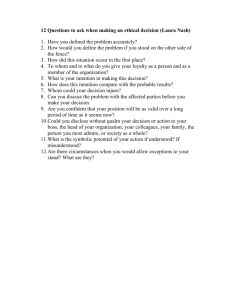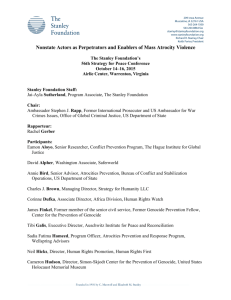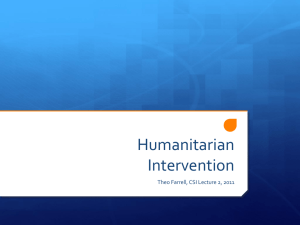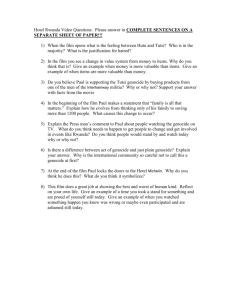The Ethics of War
advertisement
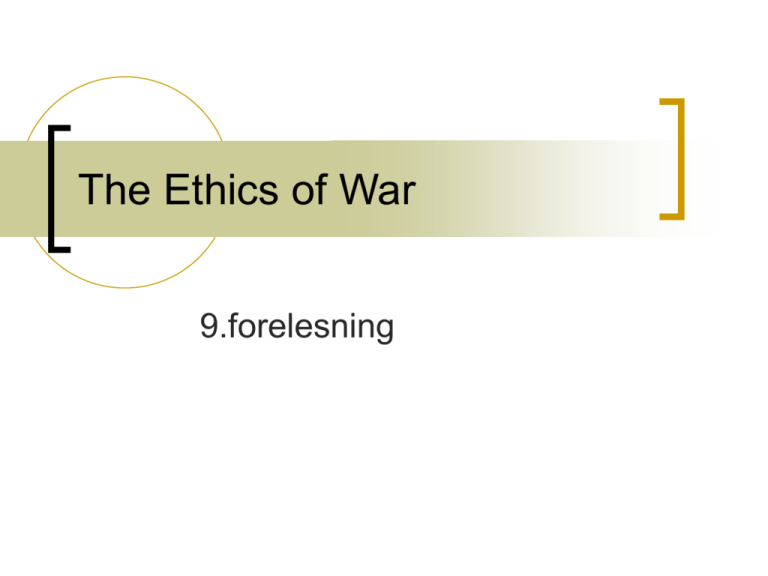
The Ethics of War 9.forelesning Summary/Walzer on intervention • • Legalist paradigm: Political communities (states) as self-determining => principle of non-intervention (prima facie rule) Exceptions (revisions of legalist paradigm): Secession Counter-intervention Humanitarian intervention How should we interpret ”humanitarian” as a just cause? Violations of basic human rights (Luban)? Or as ”acts that shock the moral conscience of mankind” (Walzer), such as enslavement and massacre? Genocide as a case for humanitarian intervention - Srebrenica 11.7.1995: 8000 men and boys massacred - Rwanda 1994: aprox. one million people massacred in 100 days Convention on the Prevention and Punishment of the Crime of Genocide (1948) Article 1 The Contracting Parties confirm that genocide, whether committed in time of peace or in time of war, is a crime under international law which they undertake to prevent and to punish. Article 2 In the present Convention, genocide means any of the following acts committed with intent to destroy, in whole or in part, a national, ethnical, racial or religious group, as such: (a) Killing members of the group; (b) Causing serious bodily or mental harm to members of the group; (c) Deliberately inflicting on the group conditions of life calculated to bring about its physical destruction in whole or in part; (d) Imposing measures intended to prevent births within the group; (e) Forcibly transferring children of the group to another group. Article 3 The following acts shall be punishable: (a) Genocide; (b) Conspiracy to commit genocide; (c) Direct and public incitement to commit genocide; (d ) Attempt to commit genocide; (e) Complicity in genocide. The responsibility of the bystander (AJV) - - Agents, victims and bystanders (actions are ”tryadic” not ”dyadic”) Bystanders are persons possessing a potential to halt the agent’s ongoing actions Typology of bystanders: Passive bystanders Bystanders by assignment (e.g. UN observers) Acting and not acting ”Not acting is still acting, letting things be done by someone else, sometimes to the point of criminality.” (P. Ricoeur) Inaction as action if one decides not to act (intentional) Responsibility for omissions: the obligation to help Complicity Signal responsibility: sending a message How far does bystander responsibility extend? Doing and allowing (Arendt: ”to act is to initiate.” But does this not undermine the point above?) Three lessons 1) 2) 3) Bystanders legitimize killing and are morally complicit Deeds follow words Failure to act harms the bystander too – shames humanity Iraq: A case for humanitarian intervention? (Mellow) - - Assumptions: No WMDs in Iraq UN inspectors Intentional deception by Bush/Blair (Powell point) Illegal war of aggression Just war framework (again!) Just cause Legitimate authority Right intention Last resort Proportionality Reasonable hope of success Open declaration Just cause - - Sufficient just cause (suff. to override presumption against force) Humanitarian injustice as just cause Presumption of self-determination as basic good (and therefore) (prima facie) collective right Individual human rights and individual human suffering Some critical points The doctrine of self-help and a domestic analogy Can forcible democratisation succeed? Is forcible democratisation justified without consent? Consider the analogy… A group of attackers are torturing and killing a nearby family. You are part of an armed group (hunting buddies, say), who happen to pass the scene. You have no way to stop the attacks other than using your guns, so you prepare to shoot. The family yells at you to stop, since they are dedicated pacifists and have chosen to suffer and die. Are you wrong to shoot? Mellow: surely not! Do you agree? Right intention - - - Mixed motives/humanitarian pretext for: Oil? Culpable ignorance about WMDs? Establish hegemony in Middle-East? Finish daddy’s business? Right intention: problems - - - - Whose intention? The President? The administration? Legislative bodies? How do we identify a group’s intention? Right intention or absence of bad intentions? Mere presence of intention or also motivational force? Threshold? Counterfactual? (Necessary or sufficient or both?) Mellow: Exclude right intention! The inclusion of right intention in the JAB-criteria mixes two levels of moral judgement: jugdement of action and judgement of character… Acts are right and wrong independent of the agent’s mental states… One can do the right thing for the wrong reasons, and vice versa. True, but… Can actions be morally right or wrong independent of the agent’s mental states? Yes and no… Subjective versus objective ”ought” But permissibility is not about the objective ”ought” !!! Last resort UN inspectors could have continued But that is only relevant if WMDs were cause For the humanitarian cause, perhaps war was the only way? Legitimate authority According to IL, resort to war was illegal (Not sanctioned by SC) But immoral? Is legitimate authority substantial or merely formal requirement? Can just cause and legitimate authority be separated? (Buchanan) Legitimate authority in Iraq? Moral case/domestic analogy. Legitimate authority is substantial, not formal, criterion Risk of undermining law does not render act immoral per se Deception? Only a problem if intention is important? Proportionality - Relevant good and bad effects Good: Pertains to the just cause Bad: Possibility of civil war or destabilisation of the region How to weight incomparable effects? Thought experiments? (Imagine that..) Counterfactual: ”doing nothing” (cf. AJV) Counterfactual proportionality Conflates proportionality with last resort? ’Do nothing’ is always one of the ’last resort’ alternatives.. (Walzer, p. 81) Counterfactual proportionality allows us to dismiss the bad effects as irrelevant! (305) Demonstrated by: ”allows us to calculate upfront.” Dismisses actual consequences. But perhaps there is no other way? Pre-emptive war - Defensive war Sufficient threat: Manifest intent to injure Active preparation which makes the intent a positive danger A general situation in which waiting or choosing other options gravely magnifies the risk Always a moral risk! Particular assessment necessary. Preventive war (1) Some state of affairs X (US dominance) preserves some important value V (”Freedom and democracy”) and is therefore worth defending at some cost; To fight early, before X begins to unravel, greatly reduces the cost of the defence of V, while waiting does not avoid war (unless one gives up V) but only results in fighting on a larger scale at worse odds. (David Luban. ”Preventive War”) (2) The Bush Doctrine ”Making the world safe for democracy”. Any nation harboring terrorists is a threat to peace and liable to attack. Too risky? Walzer: Preventive war may be counter-productive (destabilising) Luban: Too risky, makes war ordinary Also: violates the rights of those who have not yet done anything to forfeit them Buchanan: 1) 2) 3) Alternative reading is possible: Preventive war can be read as preventive self-defence justification against those wrongfully imposing a dire risk (cf. The National Security Strategy) Risk is not fixed, it depends on the institutional framework (given (1); Not true that those who pose dire threat have not done anything (wrong) to forfeit rights The quest for a new institutional framework (Buchanan) Just War Norm (JWN) = legalist paradigm Preventive war and forcible democratisation challenges JWN (with regard to just cause) Buchanan: No question of choice between more or less permissive norms, but a question of replacing JWN with new institutions. Legitimate authority (Understood as proper insitutional framework) is a substantial, not just formal, criterion. The validity of a norm can depend on institutional context. Just cause requires legitimate authority! The limits of just war theory (1) (2) The validity of use-of-force norms can depend upon institutional context Validity of JWN is contingent upon the absence of satisfactory institutional framework and on the costs of risk reduction We ought to create new institutions which allows us a more permissive norm depending on whether a new norm would be morally better and the feasibility and costs of creating new institutions
